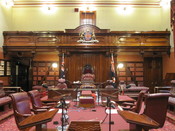Australian Developments in Legislative Independence:
1787 to the 1820s
After European settlement in 1788, Australia was politically organized as a number of separate British colonies, eventually six in all. New South Wales was governed largely as a military autocracy with few formal constraints upon the political power of the Governor. There was no provision for trial by a jury of one's peers, but only trial by military courts. The early courts comprised a judge-advocate appointed by the British government and a panel of (six or more) military officers. Later on, the trials were conducted by judges and military officers, and eventually civilian appointees were involved.
The New South Wales Courts Act 1787 (UK) and Letters Patent from the King dated 2 April 1787 ensured that the new colony had a basis for law enforcement. These instruments established a royal prerogative court of civil jurisdiction and a statutory court of criminal jurisdiction.
The criminal court first sat on 11 February 1788, and the civil court sat within a few months of colonisation. The governor also had the power to declare martial law if necessary, and martial law was declared on a few occasions in the first few years of the colony.
Essentially, the period of 1787 to 1820 was marked with a bleak militia form of autocracy. The New South Wales Courts Act 1787 promoted a sense of law enforcement, having the governors appointed in England ensured that they effectively establish the 6 colonies and therefore beginning the road to legislative independence.
1820s to 1850s
The 1820's to 1850's was a period characterized by the passing of several important bills and the establishment of various legislative Councils thus making the change from military colonies to settled Crown colonies.
The New South Wales Act 1823 (UK) repealed the New South Wales Courts...


